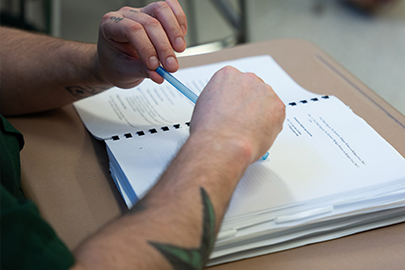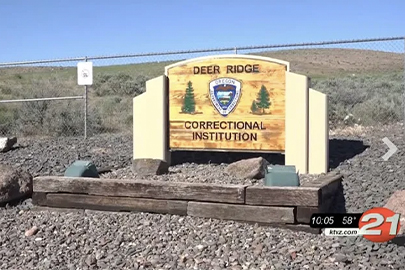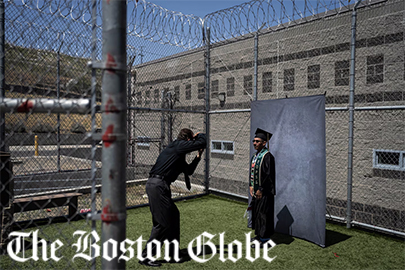On Aug. 17, 1993, David Staples was shot in Hyde Park on the south side of Chicago. The shooter was never caught.
Instead, that life-changing moment sent him to prison for 29 years for a murder he, his Quad Cities friends and the Illinois Innocence Project say he did not commit. He left behind on the outside four young daughters and a wife.
Thirty-one years later, Mr. Staples is an Augustana College graduate, in part, thanks to his introduction to the Augustana Prison Education Program and APEP’s Executive Director Sharon Varallo. He also is preparing to enter graduate school this fall at Western Illinois University. It was just one of the higher education institutions to accept the former Chicago man and inmate to a master’s degree in counseling program that he hopes will help him help others who have been caught up in the system.
Despite all that he has accomplished since his early release from East Moline Correctional Center in August of 2022, Mr. Staples faces difficult and lingering challenges. They are, what many reformers call, a long list of “permanent punishments” that greet inmates – guilty or innocent – upon their release from prison. (See the related story here.)
Chief among them for Mr. Staples is the very real possibility that even if he successfully completes his graduate studies, he will not be eligible to be licensed as a counselor in the State of Illinois if his murder conviction is not expunged.
That has not happened yet despite the work of the Illinois Innocence Project. That organization said it launched a full-scale reinvestigation of his case and found credible witnesses who tell a very different story than the one Chicago Police put together to secure his conviction in a Cook County courtroom decades ago.
“This is one of those rare cases where we know what really happened that day and we know who was really involved and it wasn’t David Staples,” the Illinois Innocence Project’s Maria de Arteaga told Chicago’s ABC-TV Channel 7’s investigative news team.
Back in court on Aug. 27
Ms. de Arteaga told the QCBJ that the petition to vacate Mr. Staples’ conviction is still pending. “We are back in court in Cook County on August 27th, and we remain hopeful that the Cook County State’s Attorney’s Office will do the right thing and join, or not oppose, the petition to vacate David’s conviction,” the senior staff attorney for the Chicago office of the Illinois Innocence Project said in an email.
As Mr. Staples waits for justice and prepares for an uncertain future, he remains both optimistic and grateful.
“I’m absolutely dependent on getting exonerated because my license is going to require it,” Mr. Staples acknowledged. But, he added, “I’m just forging ahead on faith that that will occur because it’s just about them doing the right thing. I’m pushing ahead with the full expectation that I am going to be exonerated.”
Faith also is what carried him through the past three-plus decades and it’s something Mr. Staples says he has in common with other inmates as they imagine life outside prison walls.
The difference for him, he said, is that thanks to APEP he can do more than imagine it.
“The Augustana program, I’ve said many times, has been a game changer. Getting to be a part of the program actually, I guess you could say, shaped the goals that I have now,” Mr. Staples said. “It sort of changed the trajectory to what I had initially planned of just coming out and just being in the service industry as an HVAC technician. It changed it to my wanting to help people and maybe have an impact on people who have or are currently going through my situation.”
Mr. Staples is already doing that as a volunteer. “He goes to the Scott County Juvenile Detention Center and visits people there,” Ms. Varallo said of the Augustana program’s first graduate.
Among them is a young man who was involved in the system at age 16.
“He was a high school dropout. David talked with him about getting his GED and getting employed,” she said. “He didn’t think he could. But David on his own approached five businesses in Rock Island and asked them ‘Would you hire a young person who has been involved in the justice system.’ They all said, ‘yes.’”
That young man has a job and is talking about getting his GED.
Mr. Staples also volunteers in his new community. When the QCBJ interviewed him by phone he was working to collect bikes for the Rock Island-based Heart of Hope’s bicycle drive earlier this summer. That organization has provided Mr. Staples with housing and other support after his prison release.
Working to help others
These days, Mr. Staples also is interning at the Rock Island Downtown Alliance. That agency was seeking part-time ambassadors to keep the Downtown Special Service Area clean at the same time that APEP was seeking partners to provide second-chance employment opportunities for its students.
After meeting Mr. Staples and learning of his goals, the alliance’s Executive Director Jack Cullen was convinced that Mr. Staples could provide street outreach to individuals experiencing quality of life issues and connect them with helpful resources to get them off the streets and into stable housing.
“David is a great addition to our team, and we are proud to have the first APEP graduate wearing the Downtown Alliance uniform,” Mr. Cullen said. “He has a keen ability to connect with people from all sides of life and an unstoppable drive to help others get the services they need to thrive. David’s work each week helps keep downtown Rock Island safe and welcoming for all members of the community.”
In addition to all that, Ms. Varallo said, Mr. Staples is operating his own Staples Heating & Cooling, an HVAC service and repair program, to support himself.
In those ways and others, she said, “David is already making a difference.” He wants to do more once he gets his master’s degree in counseling and psychology. “But he’ll never get licensure without his exoneration,” Ms. Varallo said.
As the case drags on, Mr. Staples refuses to despair.
“I couldn’t profit from that. If I’m bitter, where do I focus? How do I benefit from that?” Mr. Staples asked.
“It was the system that failed me, so systems can be changed and that’s how I’ve always approached that. But the biggest part is my faith. I think that’s the biggest component of it.”
It also helps him focus on “something much bigger than myself.”
That hope also carried him while he was inside the walls of East Moline Correctional Center.
“If you think about it in many cases, especially mine, at times hope is all you have. There’s been a lot of days with no one there, and I had hope.”
But did he ever let himself believe that one day he would be graduating from college? Or reuniting with the four daughters he never had the opportunity to get to know until now, their children and his own brother and sister? Many of them were among the crowd at his May 2024 Augustana graduation and at the Tony’s Pizzeria party afterward.
“I did not. I did not expect to be going to grad school with the momentum and desire to go further,” he said. “Sometimes it surprises me. I’ve always said that this path, this journey I’m on, I’m not the one choosing it, it chose me.”
Mr. Staples also maintains that there are many inmates in prison just like him. They have hopes, dreams and a lot to give their communities.
“Most of the guys there do think about jobs. They’d prefer to work,” he said.
“The Achilles heel for all of them,” he said, is that they “are there because of poverty and lack. I don’t have a study for adults but with my studies in juveniles in 70 to 80% of cases poverty is the leading cause of incarceration.”
In addition to poverty, autism, learning disabilities, challenges including lack of opportunity have had an impact.
“The people who are incarcerated in this country aren’t any different from your neighbors, from your family or your knuckle-headed kids,” Ms. Varallo added. “This population is the American population.”
AT-A-GLANCE: Augustana Prison Education Program (APEP)
- Began in 2020 as a non-credit volunteer effort by Augustana College faculty.
- Launched in fall of 2021 as a full-time, liberal arts BA degree college program at East Moline Correctional Center (EMCC).
- The primary major for inmates is American Studies.
- David Staples was the first to graduate from Augustana College. He’s expected to be joined by two others, including his fellow APEP board member Tyrone Stone. Mr. Stone has interned with Augustana’s EDGE Center and Illinois state Rep. Gregg Johnson’s (D-East Moline) office.
- Classes include 10 students who earn regular Augustana credits that can be transferred to other colleges and universities.
- The program is modeled after the Bard Prison Initiative featured in the 2019 PBS documentary College Behind Bars.
- APEP is run by Executive Director Sharon Varallo, Augustana communications professor, who was inspired to act by her daughter’s arrest for a crime she did not commit.
- A total of 30 faculty members have taught at EMCC since the program began.
- APEP is privately funded by a $1 million grant and a 10-year commitment by the Austin E. Knowlton Foundation in 2022. It launched with a $225,000 seed grant from the foundation.
- Additional support comes from individual, foundation and corporate donors.
- Students do not pay tuition or costs for EMCC coursework. Those who qualify may contribute to the cost via Pell Grants, but it is not required.
The Augustana Prison Education Program (APEP) joined the Consortium in 2022. Founded in 2021 by Augustana College, a selective, private liberal arts college in Rock Island, IL, APEP offers a BA degree with Communication Studies and American Studies majors at East Moline Correctional Center (EMCC). With ongoing technical assistance from BPI’s National Engagement team, and as members of the 2021 cohort of the BPI Summer Residency, APEP launched in August 2021 with 10 students and a full academic year of coursework.
This article was originally posted by Quad Cities Regional Business Journal and can be found here.





